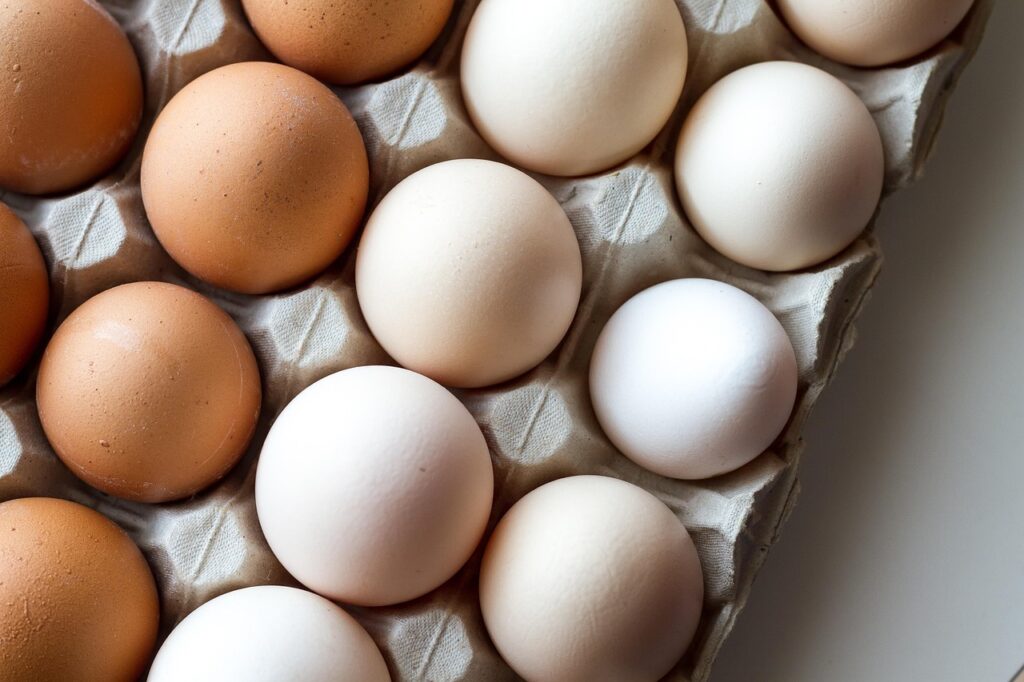Introduction: How Long Are Farm Fresh Eggs Good for on the Counter?
If you’ve ever picked up a dozen eggs straight from a backyard farm or local farmer’s market, you’ve probably wondered—how long are farm fresh eggs good for on the counter? Unlike store-bought eggs, which are washed and refrigerated immediately, farm fresh eggs often retain a natural coating called the bloom, allowing them to last longer at room temperature.
Understanding how to store them correctly can make a huge difference in quality, taste, and safety. In this comprehensive guide, we’ll walk through the real shelf life of farm fresh eggs, what factors affect their freshness, and how to maximize their lifespan without refrigeration—especially if you’re aiming for a more sustainable, farm-to-table lifestyle.

Image by Moira Nazzari from Pixabay
What Makes Farm Fresh Eggs Different?
Farm fresh eggs differ from store-bought eggs in one key way: they’re unwashed. When a hen lays an egg, it’s coated with a thin layer called the bloom or cuticle, which seals the shell’s pores and protects it from bacteria and moisture loss.
Key Differences:
- Unwashed eggs retain the bloom, giving them a longer shelf life on the counter.
- Washed eggs, typical in U.S. supermarkets, lose that protective layer and must be refrigerated.
- Farm fresh eggs also tend to have richer yolks due to free-range or pasture-raised diets.
The Magic of the Bloom – Nature’s Protective Layer
The bloom acts as a natural barrier that prevents bacteria from entering the egg through its porous shell. This is why eggs in many countries—like France, the UK, and Australia—are often stored without refrigeration.
Fun Fact:
In the U.S., FDA regulations require eggs sold commercially to be washed and sanitized, removing the bloom. That’s why they must be kept cold.
So, if you get unwashed farm fresh eggs, they can safely sit out at room temperature for up to two weeks, sometimes longer under ideal conditions.
Washed vs. Unwashed Eggs: What’s the Shelf Life Impact?
| Type of Egg | Storage Method | Shelf Life |
| Unwashed Farm Egg | Room Temp (60–70°F) | 2–3 weeks |
| Unwashed Farm Egg | Refrigerated | 3+ months |
| Washed Egg | Room Temp | Unsafe after 2 hours |
| Washed Egg | Refrigerated | 4–5 weeks |
Bottom Line:
Don’t wash farm eggs if you want to keep them on the counter. If they’re already washed, refrigerate immediately.
Room Temperature Storage: How Long is Safe?
Generally, unwashed farm fresh eggs last 2 to 3 weeks on the counter without any issues. In cooler, stable indoor environments, they may even last up to 4 weeks. But once the bloom is compromised—either by washing or condensation—the clock starts ticking faster.
Tips for Safe Room Temp Storage:
- Store between 60–70°F (15–21°C)
- Avoid direct sunlight
- Keep them dry and away from strong-smelling foods or chemicals

Factors That Affect Egg Freshness
Several environmental and handling factors determine how long eggs stay fresh on the counter:
- Temperature Fluctuations – Higher temps speed up spoilage.
- Humidity – Moisture can weaken the shell or promote bacteria.
- Airflow – Good ventilation helps reduce mold risk.
- Handling – Cracks or smudges can introduce bacteria.
A consistent, cool, dry space extends shelf life. If in doubt, move to refrigeration.
Signs Your Eggs Have Gone Bad
You don’t need fancy tools to check if your eggs are still good. Here are some simple tests:
- The Float Test: Place the egg in a bowl of water.
- Sinks and lies flat = fresh
- Stands upright = 2–3 weeks old, still usable
- Floats = toss it
- Sinks and lies flat = fresh
- Smell Test: A spoiled egg will have a pungent sulfur odor when cracked open.
- Appearance: Look for unusual cloudiness, blood spots, or moldy shells.
How to Store Farm Fresh Eggs on the Counter Safely
To get the most out of your unwashed eggs, store them like a homesteader:
- Use a cool corner of the kitchen
- Rotate older eggs to the front
- Keep them in a covered container or ceramic holder
You can also mark the date of collection with a pencil directly on the shell to track age.
Best Containers for Countertop Storage
Here are the most reliable containers for farm egg storage:
| Container Type | Pros | Cons |
| Wire Basket | Breathable, rustic look | Exposes eggs to light |
| Ceramic Holder | Stable temp, dark | Less airflow |
| Egg Skelter | First-in, first-out system | Takes up counter space |
| Wooden Box | Stylish, light-blocking | Can be bulky |
Should You Refrigerate Farm Fresh Eggs?
That depends on your location and preferences. In Europe, room temp is common. In the U.S., due to stricter sanitation laws, refrigeration is usually advised for washed eggs.
Refrigerating unwashed eggs isn’t necessary—but doing so can extend their shelf life up to 3 months or more.
The Shelf Life of Refrigerated vs. Non-Refrigerated Eggs
| Storage | Washed Eggs | Unwashed Eggs |
| Counter (room temp) | Unsafe after 2 hrs | 2–3 weeks |
| Fridge | 4–5 weeks | 3–4 months |
| Freezer (cracked & beaten) | Up to 1 year | Up to 1 year |
Tip: Label the collection date before storing in the fridge or freezer.

Image by congerdesign from Pixabay
How Long Do Farm Fresh Eggs Last After Washing?
Once washed, eggs should be treated like store-bought ones.
- On the counter: Use within 2 hours
- In the fridge: Safe for 4–5 weeks
Avoid washing until just before use to maximize shelf life.
Are Room Temperature Eggs Safe to Eat?
Yes—if unwashed and stored correctly, they’re perfectly safe. Most of the world eats room-temp eggs without issue.
However, if your kitchen regularly exceeds 75°F or you live in a humid climate, refrigeration might be safer.
For official safety info, check: USDA Egg Safety
Tips to Extend Shelf Life of Farm Fresh Eggs
- Rotate eggs every few days to keep yolks centered
- Preserve in lime water (hydrated lime + water) to store eggs up to 6 months
- Use mineral oil: Coat eggs lightly to reinforce the bloom
Myths About Egg Storage – Debunked!
- “Eggs go bad after a week on the counter”
→ Not true if unwashed and stored correctly - “You must wash eggs right away”
→ Washing removes the natural barrier; delay it until use - “Only refrigerated eggs are safe”
→ Many cultures store eggs without refrigeration
How Long Are Farm Fresh Eggs Good in Summer vs. Winter?
- Summer: 1–2 weeks if room exceeds 75°F; refrigerate to be safe
- Winter: 3–4 weeks indoors if temps stay cool and stable
Humidity and heat accelerate spoilage. Adjust storage based on season.
Frequently Asked Questions (FAQs)
1. Can you eat eggs that have been on the counter for 3 weeks?
Yes, if they are unwashed farm eggs and passed the float and smell tests.
2. What’s the best way to preserve farm fresh eggs long-term?
Refrigeration or submersion in lime water are your best bets.
3. Do farm eggs need to be refrigerated?
Not if they’re unwashed and stored in a cool, dry place.
4. How do I know if my eggs are still fresh?
Use the float test, crack test, and smell test.
5. Is it okay to wash farm eggs right after collection?
Avoid washing until you’re ready to use them to keep the bloom intact.
6. Can farm fresh eggs be frozen?
Yes—crack, beat, and store them in airtight containers before freezing.

Image by Varintorn Kantawong from Pixabay
Conclusion: Freshness Is in Your Hands
Storing farm fresh eggs on the counter can be totally safe and effective—if done right. With a bit of knowledge about the bloom, handling tips, and environmental control, you can enjoy nutrient-rich eggs without relying on the fridge. Always use your senses—and when in doubt, test it out!
